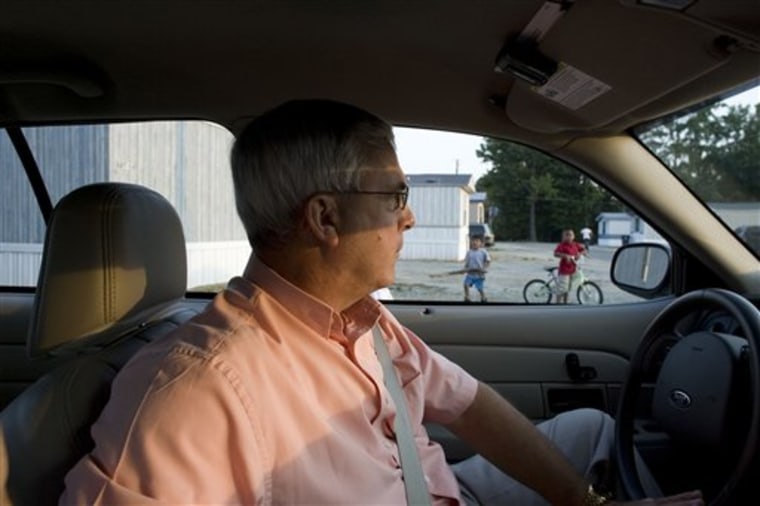For years, Sheriff Steve Bizzell watched the number of illegal immigrants in his rural county skyrocket — and with it, he says, residents' fear that the newcomers were responsible for more than their share of crime.
So he helped make North Carolina the first state where every county can team with federal authorities to train local officers to identify and track jailed illegal immigrants, speeding up the deportation process.
But in a newspaper interview last month, Bizzel complained that "Mexicans are trashy" and pointed to several children playing and said "All they do is work and make love." Though he quickly apologized, his contrition wasn't enough to ward off critics who call his comments evidence that the nation's increasingly popular efforts to enforce immigration statutes locally have nothing to do with law and order.
"The chief law enforcement officer is demonstrating his racism in public, and he's allowing his officers to do the same," said Tony Asion, the executive director of nonprofit advocacy group El Pueblo and a retired Delaware state trooper. "It gives them the green light to treat Latinos any way."
Rebuffing calls for his resignation
Bizzell declined to comment to The Associated Press about the remarks to the News & Observer that caused the uproar, and the Johnston County commission has rebuffed calls for his resignation.
Twenty years ago, roughly 77,000 Hispanics lived in North Carolina — about 1.2 percent of the population. At about 600,000 today, Hispanics represent 6.6 percent of the state's 9.1 million residents, the 12th-largest overall Latino population among the 50 states.
The Washington-based Pew Hispanic Center estimated in 2006 there were about 400,000 illegal immigrants in North Carolina, most of whom are Latino. There is no breakdown based on ethnicity.
In Bizzell's Johnston County, a short drive from Raleigh, Hispanics made up 1.5 percent of the population in 1990. Now, the group represents about 11 percent of the county's nearly 160,000 people.
"Look at that," he said, pointing at a storefront during his tour of the area with the newspaper reporter. "You can't even read the durned sign. Everywhere you look, it's like little Mexico around here."
The 49-year-old has been the county's top cop for 10 years and has said residents fear most crime is committed by illegal immigrants. In 2006, he said that based on arrests, Hispanics were responsible for up to 85 percent of drug trafficking in the county.
Records of arrests based on ethnicity
Yet Bizzell's own employees in the sheriff's office said recently they do not keep records of arrests based on ethnicity.
North Carolina has embraced a federal program known as 287(g). It gives local police access to the Immigration and Customs Enforcement agency's database of fingerprints and photographs. The program has spread to departments across the country and is credited with identifying 70,000 since 2006 alone suspected of being in the U.S. illegally.
Republican Sen. Elizabeth Dole led successful efforts to open 287(g) and a few other enforcement programs to every sheriff's office in the state. Politically, the idea couldn't be more popular: Dole's Democratic opponent supports it, as do both candidates for governor.
Bizzell helped Dole broker the expansion, and said at the time the purpose wasn't to begin a wholesale roundup of illegal immigrants but to help the community.
"We're tired of crime in general, but we're darn tired of crime that involves an illegal criminal alien who shouldn't be here in the first place," he said then.
Not all opinions of the program are positive, even among Bizzell's fellow sheriffs.
Jail time for traffic violations
Buncombe County Sheriff Van Duncan told Spanish-language paper La Voz Independiente last week that he's worried that so many people are being pulled over and jailed through 287(g) on simple traffic violations.
"It is not a perfect program," Duncan said. "One of the things that is hard to explain away is that for otherwise law-abiding citizens, other than the fact that they are here undocumented, what IDs them is a minor violation or even driving to work, having to drive with no operator's license."
Bizzell's comments to the newspaper "go from simply stating opinion to constituting illegal racial profiling if these opinions are reflected in practice," said Jennifer Rudinger, the executive director of the American Civil Liberties Union of North Carolina. "It's one thing to think something and say something. It's another to have that kind of bias carried out and enforced."
Rudinger said the ACLU is seeking information from Johnston County about the number of drunken-driving checkpoints, arrests and jail bookings to see if Bizzell's department is complying with state law prohibiting profiling.
Bizzell's attorney Ronnie Mitchell said that will only be good for his client.
"Those documents reinforce Sheriff Bizzell's commitment to fairness, liberty, and justice for all."
